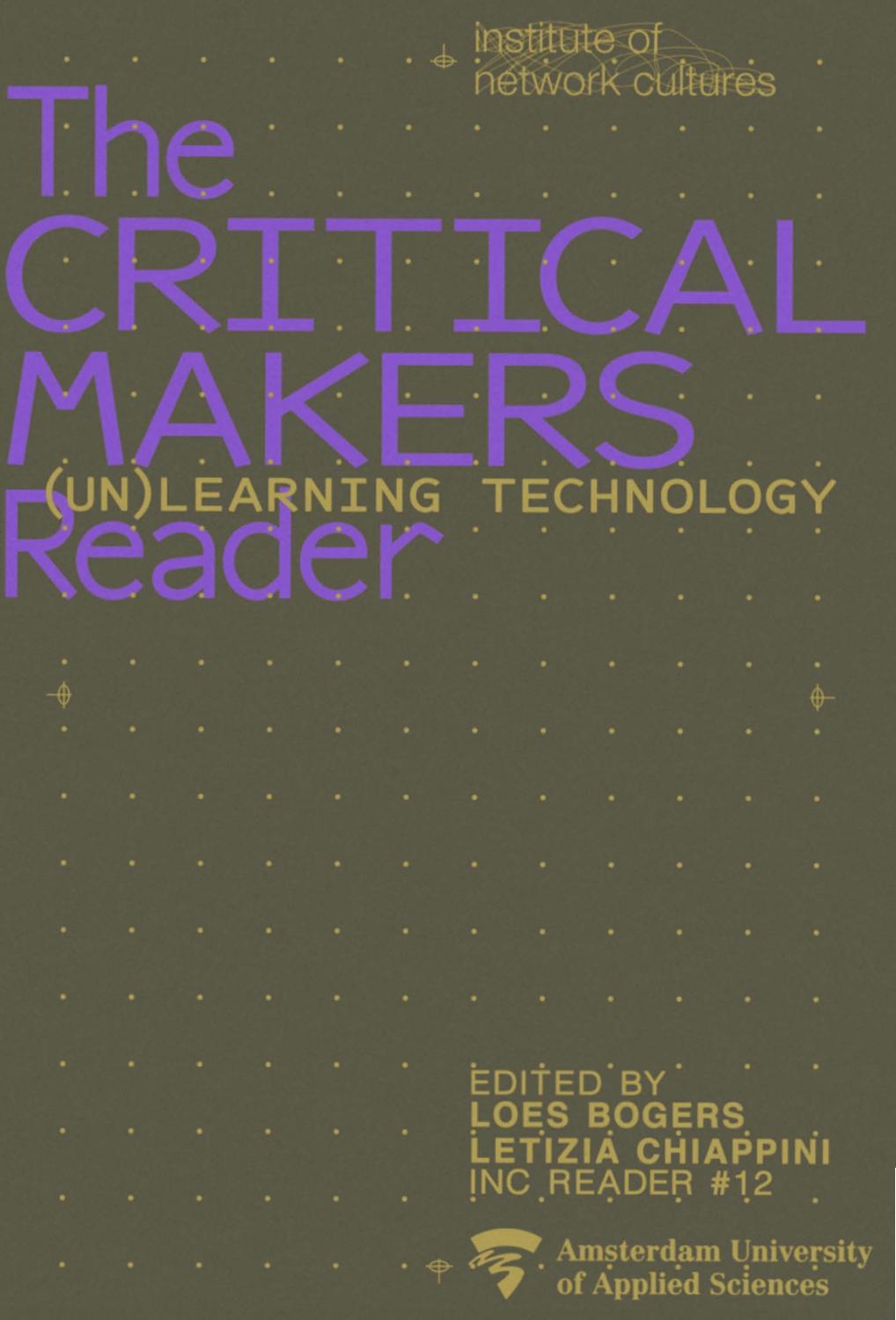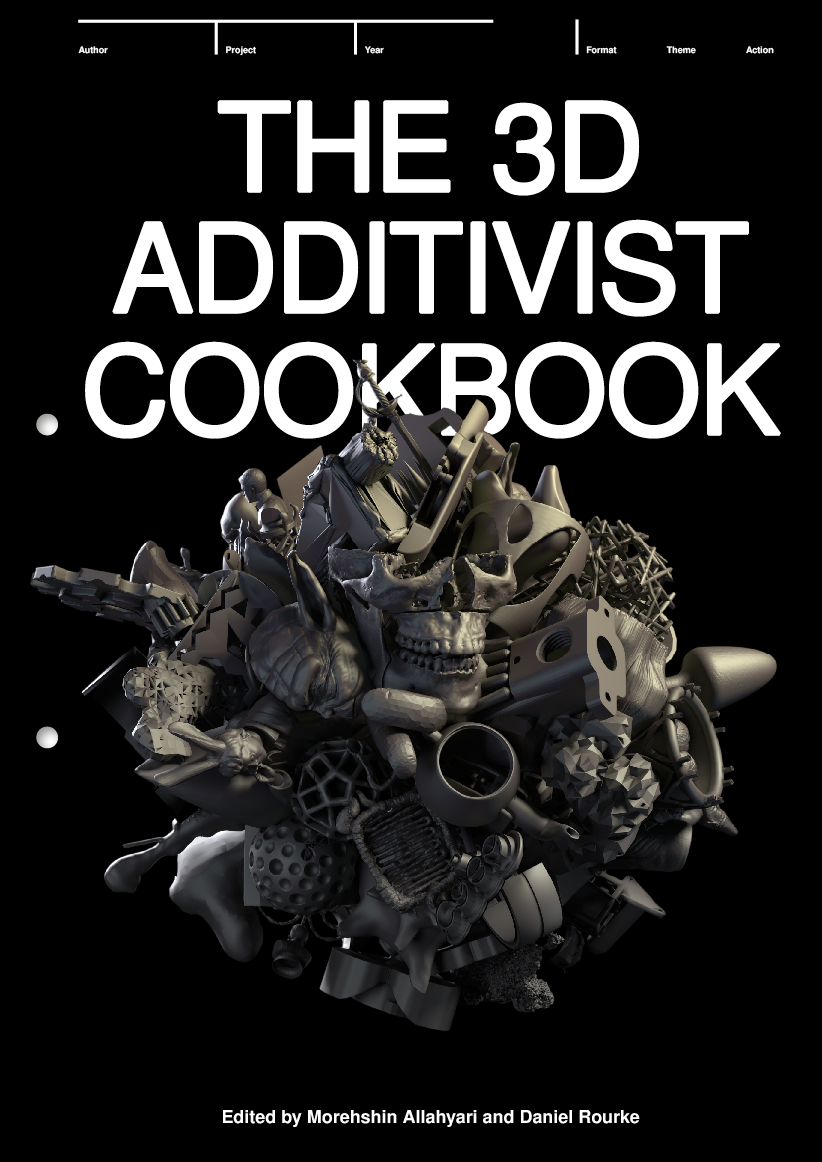Loes Bogers, Letizia Chiappini (eds.): The Critical Makers Reader: (Un)learning Technology (2019)
Filed under book | Tags: · 3d printing, critical making, maker culture, media labs, repair, technology

“A decade ago many gushed at the possibilities of 3D printers and other DIY tech. Today makers are increasingly shaking off their initial blind enthusiasm to numerically control everything, rediscovering an interest in sociocultural histories and futures and waking up to the environmental and economic implications of digital machines that transform materials. An accumulation of critique has collectively registered that no tool, service, or software is good, bad, or neutral—or even free for that matter. We’ve arrived at a crossroads, where a reflective pause coincides with new critical initiatives emerging across disciplines.
What was making? What is making? What could making become? And what about unmaking? The Critical Makers Reader features an array of practitioners and scholars who address these questions. Together, they tackle issues of technological making and its intersections with (un)learning, art and design, institutionalization, social critique, community organizing, collaboration, activism, urban regeneration, social inequality, and the environmental crisis.
Contributors: Kat Braybrooke, Abigail Browning, xtine burrough, Serena Cangiano, David Cole, Critical Media Lab, Maria Dada, Sharon Ede, Lori Emerson, Gareth Foote, Bernhard Garnicnig, Krystin Gollihue, Anja Groten, Xin Gu, Graham Harwood, Deanna Herst, Garnet Hertz, KairUs, Tom Keene, Cindy Kohtala, Verena Kuni, Maya Livio, Benjamin Matthews, Wim Nijenhuis, Paul O’Neill, Samantha Penn, Hannah Perner-Wilson, Matt Ratto, Pip Shea, Caroline Sinders, Lucy HG Solomon, Peter Troxler, Grace Van Ness, and Eva Verhoeven.”
Publisher Institute of Network Cultures, Amsterdam, Nov 2019
INC Reader series, 12
Creative Commons BY-NC-ND 4.0 International License
ISBN 9789492302366
320 pages
PDF, PDF (17 MB)
EPUB, EPUB (16 MB)
Morehshin Allahyari, Daniel Rourke (eds.): The 3D Additivist Cookbook (2016)
Filed under book | Tags: · 3d printing, activism, additivism, art, design, hacking, plastic

“The 3D Additivist Cookbook is a compendium of imaginative, provocative works from over 100 artists, activists and theorists.
The accompanying 3D Additivist Archive contains 3D .obj and .stl files, critical texts, templates, recipes, (im)practical designs and methodologies for living in this most contradictory of times.”
Publisher Institute of Network Cultures, Amsterdam, 4 Dec 2016
Creative Commons BY-NC-SA 4.0 International License
ISBN 9789492302106
[356] pages
Cookbook: PDF, PDF, IA, Scribd (460 MB)
Archive: torrent, magnet (6 GB)
Garnet Hertz (ed.): Critical Making (2012)
Filed under artist publishing | Tags: · 3d printing, art, contemporary art, critical making, design, diy, diy biology, engineering, hacker culture, hackerspace, machine, maker culture, manifesto, open source, science, technology

“Critical Making is a handmade book project by Garnet Hertz that explores how hands-on productive work ‐ making ‐ can supplement and extend critical reflection on technology and society. It works to blend and extend the fields of design, contemporary art, DIY/craft and technological development. It also can be thought of as an appeal to the electronic DIY maker movement to be critically engaged with culture, history and society: after learning to use a 3D printer, making an LED blink or using an Arduino, then what?
The publication has 70 contributors ‐ primarily from contemporary art and academia ‐ and its 352 pages are bound in ten pocket-sized zine-like volumes. The project takes the topic of DIY culture literally by printing an edition of 300 copies on a hacked photocopier with booklets that were manually folded, stapled and cut. The 300 finished copies were primarily given away for free to project contributors, individuals and institutions important to them. Some of the handmade copies were traded for reviews, photographs, videos, lectures and were given to library archives.
Due to the large demand for this content, the entire collection had been scanned and released on conceptlab.com/criticalmaking and through the Twitter account @criticalpdfs.”
Publisher Telharmonium Press, Hollywood/CA, November 2012
Open Access
10 booklets, 352 pages total
Reviews: Debatty (We Make Money Not Art, 2013), Blue (Engine Institute, 2013).
single PDF (36 MB)
PDF contributions (67 pieces)

